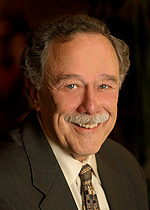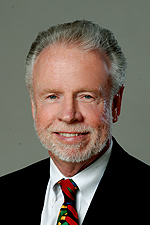Berkeleyan
Berkeley Citations awarded to Cummins, SPH’s Spear
![]()
08 May 2008
Two longtime Berkeley luminaries — a scholar whose work has had a significant impact on public health from California to China, and a senior administrator who has played a pivotal role in crisis management as the top aide to four different chancellors — have been awarded the Berkeley Citation for their “distinguished achievement and notable service to the university” over careers here that together represent nearly three-quarters of a century.
The campus’s highest honor was presented in separate ceremonies to Robert Spear, professor of public health, and John Cummins, who retired last week as associate chancellor and chief of staff. They join a list of extraordinary staff, faculty, administrators, and friends of the campus who have received the Citation since its creation in 1968 as part of the University of California’s centennial celebration.
 Robert Spear (Peg Skorpinski photos) |
Spear was already at Berkeley in the 1960s, earning both his bachelor’s and master’s degrees in engineering. After getting his Ph.D. at Cambridge University he returned to campus to join the School of Public Health faculty in 1971. He became founding director of the Center for Occupational and Environmental Health in 1980, and later served as associate dean of the School of Public Health.
The presentation to Spear was made by the school’s current dean, Stephen Shortell, at its annual faculty-recognition dinner last week. In a nominating letter to Chancellor Robert Birgeneau, Shortell noted Spear’s early research on exposure of agricultural workers to pesticides, and his current work — in collaboration with colleagues at Berkeley and the Sichuan Institute of Parasitic Disease in China — in “the use of mathematical and statistical techniques in the assessment and control of exposures to both chemical and biological agents.”
Added Kirk Smith, a professor of global environmental health, in a separate nominating letter: “It would be difficult to exaggerate Bob’s contributions across a broad range of activities in the university.”
 John Cummins |
Cummins arrived at Berkeley in 1972 to take a job with what today is the Center for Studies in Higher Education, moving to the chancellor’s office in 1984. The value of his contributions was clear from the speakers’ list at his retirement celebration, where Birgeneau presented him with the Berkeley Citation. Joining the chancellor were two of the other chancellors for whom Cummins served as chief of staff, Ira Michael Heyman and Robert Berdahl; Di-Hwa Tien, widow of the late Chancellor Chang-Lin Tien; and the current and former mayors of Berkeley, Tom Bates and Loni Hancock.
Their comments reflected both Cummins’ diverse portfolio during the past two decades — his responsibilities have included athletics, public affairs, and relations with local and state government officials — and the affection in which he is held.
“John has been just magnificent, working with the city, working with me and Loni over all these years to be able to calm the waters, to come up with logical solutions to perplexing problems,” said Bates.
“The major thing he did was that he tamed the demonstrators,” joked Heyman, citing Cummins’ relationships with both the chief of police and protest leaders during massive anti-apartheid demonstrations in the mid-1980s. Cummins, he said, was “a wonderful problem-solver, a great communicator, and was friends with nearly everybody.”
Added campus spokesperson Marie Felde, who has worked with Cummins during countless campus crises: “If you’re stuck in the trenches, it’s really nice to be there with John Cummins.”

